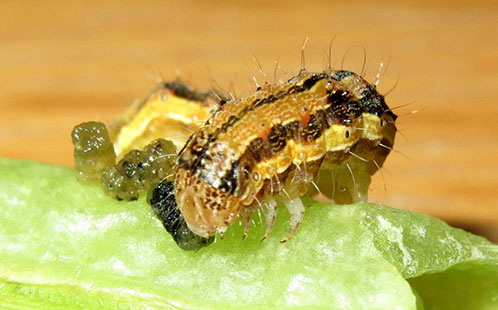Western Sydney University reveals silicon the secret weapon for crop protection

Published in Biology Letters (opens in a new window), ground-breaking Western Sydney University research reveals adding silicon to wheat crops (Triticum aestivum) increases leaf silicon levels, enhancing tolerance to attacks by chewing insects.
Totalling more than $100million annually in Australia, crop losses to insects require farmers to use expensive pest-control treatments that reduce profitability and increase safety concerns. Research underway at Western Sydney University’s Hawkesbury Institute for the Environment is investigating whether adding silicon to crops can reduce damage caused by chewing insects.
“Tolerance refers to the ability of plants to put up with being chewed by insects, and it reflects a plant’s strategy to compensate for any damage,” said Associate Professor Scott Johnson, a Future Fellow researcher at the Hawkesbury Institute for the Environment.
“This strategy is surprisingly successful – the leaf growth actually increased by 14 per cent and the root damage was minimised to 16 per cent when we added silicon to the trial plants, so clearly wheat plants can fight back against insect chewing. The outcome is that the crops achieved the same growth as plants that were not attacked.”
The study potentially has major implications for other grassy crop plants such as barley, rice and maize that, collectively, provide more than 42% of the world’s calorie intake. Given the immense losses that occur in crops from insect pests both above- and underground, addition of silicon could offer a safe and relatively low-cost form of crop protection.
About The Hawkesbury Institute for the Environment
The Hawkesbury Institute for the Environment at Western Sydney University has rapidly become the leading centre of excellence in ecosystem function and environmental responses to changing climates with a strong reputation for delivering research outcomes of the highest quality.
The Institute's team of more than 50 scientists conducts innovative, world-class research across the full spectrum of life from genetic level to ecosystem level to answer the most pressing issues currently facing our country such as:
- What will rising CO2 levels mean for forestry, soils and our agricultural industries?
- How closely do CO2 prediction models match real-world changes in plant and ecosystem function?
- How does environmental change impact on plant, animal and microbial communities?
- How can we use technology to understand and better manage our most important natural and managed ecosystems in a changing world?
Mobile options:

